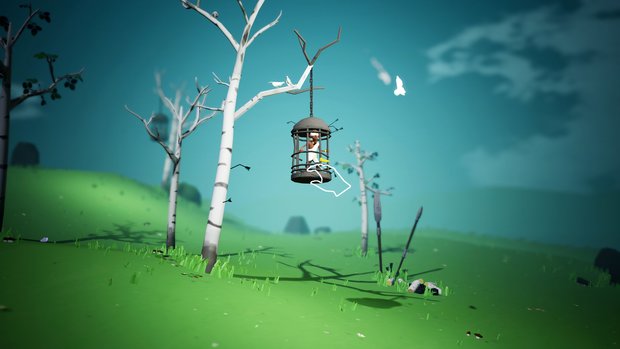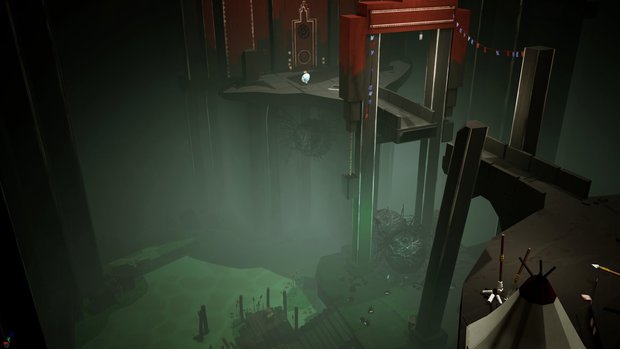EQQO review

- 0 Comments
Though short and easy, this touching allegorical tale inspired by Ethiopian legend delivers in most ways that matter
When French developer Parallel Studio came up with the concept behind EQQO, they tapped into a source of inspiration that I have never seen explored before. Inspired by Ethiopian legends, it is as much a slice of African mythology as it is an allegory about the loss of childhood innocence, the ever-widening gulf between parent and child as budding maturity breeds a need for independence. Heady themes, to be sure, but they serve as a strong foundation for what is otherwise a fairly light journey filled with low-impact gameplay. The puzzles are generally easy to solve at a rapid clip, leading to a short but mostly satisfying experience that can be completed in one or two play sessions.
Although the game centers around the eponymous Eqqo, players actually take on the role of his mother Seada, a native storyteller, who also acts as the omniscient narrator relating her version of what might have happened to her son. It is up to you to guide Eqqo, who is blind, through each of the game’s fifty-plus levels, literally telling him where to go and what to interact with – standard fare for an adventure game but here also serving as a nurturing act that represents the guidance a parent provides for their child as they embark on their lives. Beyond that, though, there are also moments when you can directly interact with the environment, as you are able to pick up and throw rocks and spears, drag urns and hunks of stone around, as well as perform a few other actions.

Storyteller that she is, Eqqo’s mother is able to interpret characters’ thoughts and fantastical speech for us and be an invisible presence in everything that occurs. You assume an all-seeing “eye in the sky” position, perfectly poised to oversee each of the game’s areas as her son progresses. While you can freely direct his movements (clicking on the ground or objects produces a knocking sound that Eqqo orients towards), you yourself are relegated to a number of anchor points in each level, only able to swivel the camera around in a 360-degree field of vision from there. However, you can still get around the individual levels by jumping between these anchor points depicted as “stars” floating above the area via a simple click. In this manner, you can switch positions to get a look at any out-of-view nooks and crannies or simply keep up with Eqqo as he makes his way across the sometimes spacious landscape.
Right from the game’s first moments, we’re exposed to the emotional tone of the adventure to come. The opening hand-drawn cinematic begins with a close-up of Seada’s face, who immediately sheds a tear at the mention of Eqqo’s name. We know that what follows will not be a joyful tale for the sorrowful mother, who in a memory watches over her young son playing outside as iron-clad riders invade her land, before revealing that one day soon after, Eqqo left home and never returned. This sets us on the path, with the next scene showing that Eqqo was captured and imprisoned in a cage hung from a tree. Here you’ll be introduced to many of the gameplay mechanics as it is your job, as the protective spirit of the ever-watchful mother, to help release the child from captivity.

Not only does EQQO stand apart from many other titles in terms of cultural inspiration, it also has a neat hook in how it involves the player with its mechanics – perhaps owing to this first being developed as a mobile game. I played on Switch, and as Seada you interact with objects in the environment directly via the system’s touch-screen functionality. By tapping or pulling on objects, you’ll pick up and throw or drag them around, while tapping the ground will give Eqqo his marching orders (as long as it’s accessible). Some walls have hidden frescoes that you can uncover by literally wiping the dirt off of them, potentially offering a clue to a puzzle or simply allowing you to enjoy the native art style. In a nice touch, the Switch gives you the option to go completely button-free by panning the screen around via swiping, with further minute adjustments possible by actually moving the handheld console in the desired direction, making the screen a true window into the world beyond.
If playing in docked mode or via the more recent PC port, all of these functions are also available with a controller in your hands, with left and right analog sticks controlling the cursor and camera, respectively. What’s surprising is how well the PC version works using only the mouse. Simply move the cursor toward the edge of the screen to pan the camera in that direction, and click or click/hold to interact with relevant objects in the environment like any traditional adventure.
To minimize guesswork, objects you can interact with are color-coded, with yellow holding a special significance in this legend: yellow ribbons tied around pillars indicate you can topple them, and yellow chains can be pulled to trigger some effect or other. Your first act of business is to grab onto the yellow fabric tied around the bars of Eqqo’s cage and pull on it to topple it out of the tree to enable his escape. After guiding Eqqo through a few more screens, figuring out a few simple puzzles as you go – activating a pressure plate here or having Eqqo trigger a switch there – you soon encounter the Serpent God, a part of the Ethiopian pantheon embodied by a great white snake. It has been gravely wounded, set upon by the masked riders encountered earlier, symbolizing the threat posed to native customs and heritage by outsiders. In its final moments, the Serpent God bestows upon Eqqo the Enkolal, an egg that must be returned to the Temple of Issa. Carrying the Enkolal, Eqqo sets out on his quest to deliver the egg and see the Serpent God reborn.
Even though, on paper, all this makes EQQO sound like a game-long escort mission, the real heart of the game is to experience Eqqo’s plight along the way, caring for the egg and being genuinely distressed when something threatens this stand-in for his people’s culture. Of course, the story is as much Seada’s as it is Eqqo’s, with the mother accompanying her son in spirit, guiding him on his journey, clearing a path for him when needed, and in effect enabling him to grow further and further apart from her in the process. There’s a tragic sense of loss evident between the lines here, the grief of any parent who’s ever raised a child only to watch them sail off into the sunset once they’re strong enough to take charge of their own life, that bittersweet release of dependence blossoming into adulthood.

Though Seada’s role is behind the scenes, for all intents and purposes, there are times when she needs to take a more active role in protecting the Enkolal. Though Eqqo can interact with a few mechanisms, he is usually preoccupied with physically carrying the egg onwards, leaving Seada to pull chains, rotate dials, and direct light beams via mirror lens contraptions. In order to carry out his own interactions, though, Eqqo will sometimes have to set down the Enkolal, or even abandon it temporarily when he needs to squeeze through a set of iron bars that it cannot itself fit through. In these instances, little shadowy creatures, found in select levels, will often greedily swarm towards the egg, and will carry it back to their den if left unchecked, forcing a level restart. This is when you must pull double duty, directing Eqqo toward his objective while quickly rushing back to the Enkolal to keep these creatures at bay with well-placed rock or spear throws, buying Eqqo time to wrap up his business and secure the egg again.
Against these minor enemies, Eqqo’s presence is deterrent enough; they will scatter when he draws near and will never attack him directly. However, it doesn’t take long before you encounter the Bell Ringer, a hulking enemy (whom you unwittingly unleash) with a great appetite that can only be satiated by gobbling up the Enkolal. The Bell Ringer, when he does appear, cannot be fought directly and must instead be foiled with quick and decisive action. He has no interest in Eqqo; his only goal is to devour the egg, and the only way to stop him doing so is to turn the temple’s traps against him, or simply grab the egg tight and make for the safety of the next level. However, the game is fairly lenient when it comes to the time windows it gives you to stay one step ahead. Should you fail, you’ll just need to restart the level, which isn’t too bad as most levels can be completed in a matter of a few minutes. There’s even a satisfying resolution for the Bell Ringer near the game’s end, all achieved without any inkling of combat.
EQQO is a poignant tale overall, brief as it may be at only two or three hours, punctuated by lots of well-performed narration and a touching score. As the sole voice-over we get to hear, Seada's actress mixes the inner turmoil of a bereaved parent with the natural inclination toward drama and storytelling of a born orator. The cast of shadowy creatures communicate via other sounds: the more diminutive will squeak and squeeble while the Bell Ringer utters malicious, slithering hisses and whispers. Music is used sparingly, sometimes making way for the environmental sounds of babbling brooks and tinkling wind chimes, but more often letting the silence of abandoned places roar loudly. When the lovely instrumental score (consisting of lots of dolorous strings and other classical instruments) does come in, it’s reserved for key emotional moments for maximum effect.
The artistic direction serves to underscore the game’s overtly relaxing atmosphere. During the first several levels, you’ll get to revel in beautiful green fields dotted with the occasional tree, while towering rocks and scattered remains of ancient ruins give rise to the sense of ancient history here. The vistas stretch far and wide, simple and uncluttered under open skies. Once you head into the Temple of Issa, the open outdoor surroundings give way to indoor spaces that stretch just as far and wide into cavernous blackness. The sense of history is still apparent, with wall frescoes and mechanisms, stone steps that lead to darkened doorways, all hinting at the existence of long-gone denizens. The artistry leans toward the more realistic side of things, though still living somewhere on the “child’s storybook” spectrum. Depth perception is often driven home by the camera keeping focus sharp where it thinks you’re looking (or where your cursor is) while utilizing a blurring effect that I quite liked but can be finnicky in handheld mode on areas up close or further in the distance.
Final Verdict
EQQO seems the definition of a passion project, a narrative at once universal in its motifs and yet something so personal it must’ve had a special meaning to its developers. What it does, it does well, which is to convey a charming story within a story, a mother at once protecting her son while letting him go into the wider world, and that son on a quest to save an object emblematic of a future for his people’s way of life. It’s a lonely game, at once doleful and at peace with that fact, but it’s lovely all the same. Yet for all that it’s not a terribly deep experience, beyond its allegorical qualities. Its simple gameplay is focused more on advancing the immediate narrative rather than the world it’s building, but the game’s short length and forgiving retry system make it easy to commit to for anybody who thinks they might enjoy getting lost in a foreign land for a spell.
Hot take
Designed for ease of play, what the culturally distinctive EQQO lacks in depth, it makes up for with its charming, multilayered allegorical story.
Pros
- A universal tale about parenthood and the importance of preserving one’s culture
- Lovely soundscape that mixes in effective use of silence
- Short, bite-sized levels make for a constant sense of progress
- Touchscreen design is ably carried over to big-screen functionality
Cons
- Puzzles are very simple
- Short runtime may leave some wanting for more
Pascal played his own copy of EQQO on Nintendo Switch.











0 Comments
Want to join the discussion? Leave a comment as guest, sign in or register in our forums.
Leave a comment